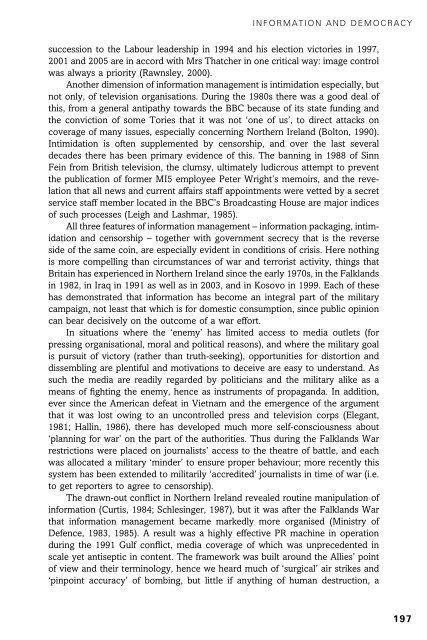Theories of the Information Society, Third Edition - Cryptome
Theories of the Information Society, Third Edition - Cryptome
Theories of the Information Society, Third Edition - Cryptome
You also want an ePaper? Increase the reach of your titles
YUMPU automatically turns print PDFs into web optimized ePapers that Google loves.
INFORMATION AND DEMOCRACY<br />
1<br />
1<br />
1<br />
2<br />
1<br />
1<br />
succession to <strong>the</strong> Labour leadership in 1994 and his election victories in 1997,<br />
2001 and 2005 are in accord with Mrs Thatcher in one critical way: image control<br />
was always a priority (Rawnsley, 2000).<br />
Ano<strong>the</strong>r dimension <strong>of</strong> information management is intimidation especially, but<br />
not only, <strong>of</strong> television organisations. During <strong>the</strong> 1980s <strong>the</strong>re was a good deal <strong>of</strong><br />
this, from a general antipathy towards <strong>the</strong> BBC because <strong>of</strong> its state funding and<br />
<strong>the</strong> conviction <strong>of</strong> some Tories that it was not ‘one <strong>of</strong> us’, to direct attacks on<br />
coverage <strong>of</strong> many issues, especially concerning Nor<strong>the</strong>rn Ireland (Bolton, 1990).<br />
Intimidation is <strong>of</strong>ten supplemented by censorship, and over <strong>the</strong> last several<br />
decades <strong>the</strong>re has been primary evidence <strong>of</strong> this. The banning in 1988 <strong>of</strong> Sinn<br />
Fein from British television, <strong>the</strong> clumsy, ultimately ludicrous attempt to prevent<br />
<strong>the</strong> publication <strong>of</strong> former MI5 employee Peter Wright’s memoirs, and <strong>the</strong> revelation<br />
that all news and current affairs staff appointments were vetted by a secret<br />
service staff member located in <strong>the</strong> BBC’s Broadcasting House are major indices<br />
<strong>of</strong> such processes (Leigh and Lashmar, 1985).<br />
All three features <strong>of</strong> information management – information packaging, intimidation<br />
and censorship – toge<strong>the</strong>r with government secrecy that is <strong>the</strong> reverse<br />
side <strong>of</strong> <strong>the</strong> same coin, are especially evident in conditions <strong>of</strong> crisis. Here nothing<br />
is more compelling than circumstances <strong>of</strong> war and terrorist activity, things that<br />
Britain has experienced in Nor<strong>the</strong>rn Ireland since <strong>the</strong> early 1970s, in <strong>the</strong> Falklands<br />
in 1982, in Iraq in 1991 as well as in 2003, and in Kosovo in 1999. Each <strong>of</strong> <strong>the</strong>se<br />
has demonstrated that information has become an integral part <strong>of</strong> <strong>the</strong> military<br />
campaign, not least that which is for domestic consumption, since public opinion<br />
can bear decisively on <strong>the</strong> outcome <strong>of</strong> a war effort.<br />
In situations where <strong>the</strong> ‘enemy’ has limited access to media outlets (for<br />
pressing organisational, moral and political reasons), and where <strong>the</strong> military goal<br />
is pursuit <strong>of</strong> victory (ra<strong>the</strong>r than truth-seeking), opportunities for distortion and<br />
dissembling are plentiful and motivations to deceive are easy to understand. As<br />
such <strong>the</strong> media are readily regarded by politicians and <strong>the</strong> military alike as a<br />
means <strong>of</strong> fighting <strong>the</strong> enemy, hence as instruments <strong>of</strong> propaganda. In addition,<br />
ever since <strong>the</strong> American defeat in Vietnam and <strong>the</strong> emergence <strong>of</strong> <strong>the</strong> argument<br />
that it was lost owing to an uncontrolled press and television corps (Elegant,<br />
1981; Hallin, 1986), <strong>the</strong>re has developed much more self-consciousness about<br />
‘planning for war’ on <strong>the</strong> part <strong>of</strong> <strong>the</strong> authorities. Thus during <strong>the</strong> Falklands War<br />
restrictions were placed on journalists’ access to <strong>the</strong> <strong>the</strong>atre <strong>of</strong> battle, and each<br />
was allocated a military ‘minder’ to ensure proper behaviour; more recently this<br />
system has been extended to militarily ‘accredited’ journalists in time <strong>of</strong> war (i.e.<br />
to get reporters to agree to censorship).<br />
The drawn-out conflict in Nor<strong>the</strong>rn Ireland revealed routine manipulation <strong>of</strong><br />
information (Curtis, 1984; Schlesinger, 1987), but it was after <strong>the</strong> Falklands War<br />
that information management became markedly more organised (Ministry <strong>of</strong><br />
Defence, 1983, 1985). A result was a highly effective PR machine in operation<br />
during <strong>the</strong> 1991 Gulf conflict, media coverage <strong>of</strong> which was unprecedented in<br />
scale yet antiseptic in content. The framework was built around <strong>the</strong> Allies’ point<br />
<strong>of</strong> view and <strong>the</strong>ir terminology, hence we heard much <strong>of</strong> ‘surgical’ air strikes and<br />
‘pinpoint accuracy’ <strong>of</strong> bombing, but little if anything <strong>of</strong> human destruction, a<br />
197
















